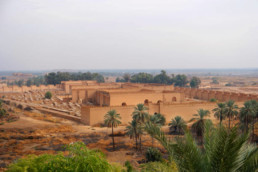Daniel: Life in Babylon, Part 6

Daniel: Life in Babylon, Part 6
Christians, do you fear who might rule us?
The king’s heart is like a stream of water directed by the LORD; He guides it wherever He pleases. Proverbs 21:1
I care deeply about who the President of the United States is. I care about which party leads the Senate and the House. I also care about the judges appointed to the Supreme Court. I vote in every election and I certainly voted in the recent election. But in light of eternity and in the advancement of God’s kingdom (which is not of this world), we would do well to keep perspective. Once again, let’s learn from Daniel.
Daniel didn’t have a choice regarding his earthly king. As a young man in 605BC, completely against his will and without any control over his immediate destiny, he came under the direct rule of the newly-minted king of Babylon, Nebuchadnezzar. Nebuchadnezzar was a brilliant and courageous military general. He expanded the control and the borders of Babylon with the defeat of such mighty nations as Assyria and Egypt. Nebuchadnezzar added Judah to his list of conquests and Daniel was part of the spoils.
From our text, it seems Daniel wasn’t fearful of his new king and his new situation. He was highly aware, watchful, observant, and most likely carrying on a conversation with God in his head about all the events unfolding before him. Nebuchadnezzar never considered for a moment that one of the youthful Judean teenagers would come to exercise massive influence and authority over him. After all, he was the king of the world. Why would he consider such an outrageous chain of events? In Nebuchadnezzar’s mind, no power in the universe could subdue him. But in reality, Nebuchadnezzar was merely a puppet in a screenplay written, produced, directed and created by God.
Friends, it’s no different today. Even though there are unprecedented events going on all around us, God is in control. Our world leaders are actors in God’s ultimate plan.
In Daniel, God revealed to us an example of extreme faith, courage, and conviction. We have learned much from Daniel thus far. But to be vulnerable can be a little intimidating, maybe even a bit annoying at times. Why? It seems Daniel never faltered. He always did the right thing. He was crazy brilliant, smart, and fearless in the face of danger and death, and he completely surrendered to His God.
Daniel was the perfect balance of the optimal spiritual qualities we all aspire toward: humble surrender to God and noble courage before men. By faith, I pray we would all grow in the grace of God to live in our Babylon with humble surrender to God and noble courage before others.
Back to my original questions: do you fear who might lead us? The recent election was not only about people wanting a certain candidate to be elected, but on both sides, it was absolute fear of the wrong candidate being elected. What has been your level of fear regarding who would rule us?
The funny thing about kings; whether it be the pharaoh of Egypt, the Persian king Ahasuerus in Esther, or Nebuchadnezzar in Daniel is that they believe the world revolves around them. In my book, What I’ve Learned from Amazing Women of the Bible, I wrote about this principle when unpacking the rich truths found in the book of Esther. The book of Esther was written without ever mentioning or referring to God. Here’s what I wrote:
The story of Esther begins with a pagan king who “appears” to be the main character of the story while the Hebrew writer chooses to not include God in the story. This is a departure from the typical practice in Old Testament narratives but clearly intentional and effective. Effective in that the narrative conveys the way the world views God or should I say, doesn’t view God. Their thoughts are not on God but His works are clearly ‘seen’ throughout the entire story.
Many people live without much thought of God. I think that’s especially true of people in positions of great power, such as the king in our story. They get up in the morning and go through the day without considering the purposes of God, the providence of God or the uniqueness of His people. They are consumed with their world, their purposes and the uniqueness of themselves.
The drama (of Esther) begins with Ahasuerus assuming the role of “king of the world” with no mention of God. Some things just never change. World rulers have been doing the same thing ever since; thinking of themselves as men of ultimate power without even a thought toward God. Little does Ahasuerus realize that the unseen God is orchestrating the entire scene for His purposes. Ahasuerus is simply a play actor in the drama that God will unfold.
The king’s heart is like a stream of water directed by the LORD; He guides it wherever He pleases. Proverbs 21:1
Humans (especially people of wealth and power), feel they can orchestrate their lives to bring about their own desired results without seeking the counsel of God. How foolish! How often do we fall into the same trap?
Let’s learn from Daniel. When it comes to people in our lives who exercise authority over us, may we approach the relationships with them as ambassadors of God. Like Daniel in his new environment with a new king, may be highly aware, watchful, observant, and carrying on a conversation with God in our heads about all the events unfolding before us, day by day. Who knows what God may do?
After many years and multiple interactions with Daniel, Nebuchadnezzar ultimately placed his faith in God.
But at the end of that period, I, Nebuchadnezzar, raised my eyes toward heaven and my reason returned to me, and I blessed the Most High and praised and honored Him who lives forever. Daniel 4:34.
Father, all of life is ordered after your purposes. We are so blessed to know You and to be used by You to influence others toward the true knowledge of Christ. Push fear out of our minds and fill us instead with hope and trust in You — for You are indeed, doing a mighty work in us and through us. Amen!
Daniel: Life in Babylon, Part 5

Daniel: Life in Babylon, Part 5
Hey Christians! Does living in Babylon divide us or unify us?
Life in Babylon, where sin flourishes and God is not honored, is a difficult place to live for us who trust Christ as our Lord and Savior. It was lonely and trying for Daniel as well. He was kidnapped as a teenager from the security of his noble family in Judah and transported to a foreign land. God placed him in Babylon where the God of Israel was not honored or acknowledged.
It’s 2020 and God has placed us in a kind of Babylon as well; we live in a foreign land that is not our home. We are ambassadors representing God where He is not honored and where sin flourishes. Life in Babylon brings daily challenges to our lives and often brings divisions. Sometimes, we simply need some help to know what to do, how to treat people, and how to make difficult decisions.
Life in Babylon often divides us Christians. This pandemic as well as racial tensions and the presidential election has divided Christians. Wow! This is unprecedented in my lifetime. I need some help to know how to think, how to live, and how to make godly decisions.
Let’s learn from Daniel.
Daniel was separated from his homeland, his parents, and his siblings. This must have been emotionally excruciating. He’s an exile in a foreign land, but fortunately, he wasn’t completely alone. In Babylon, he was segregated from the masses of Jewish exiles and instead was placed in the king’s palace with other ‘choice’ Judean youth of nobility and education. His life was turned upside down … but at least he had his friends with him. But it wouldn’t take long for the pressures of Babylon to drive the boys to make decisions that would divide them.
The king appointed for them a daily ration from the king’s choice food and from the wine which he drank … 1:5
The first decision these young people had to make was whether they would eat of the King’s food and wine. Can you imagine the conversations among the Judean youth? All of them knew it violated their dietary laws, but under the circumstances, some felt they must obey their new king. After all, they are no longer in the comfort of their homes living among like-minded, God-fearing Israelites. They must adjust and adapt to their situation. Not to mention, the king might kill them if they refuse. The fear of losing one’s head can indeed be a motivator, wouldn’t you say?
On the other hand, Daniel and his three friends felt otherwise. But Daniel made up his mind that he would not defile himself with the king’s choice food or with the wine which he drank, 1:8. They would refuse to eat and drink.
There was perhaps a third group who was torn and didn’t know what to do. But their indecision was actually their decision. Their indecision would not withstand the pressure. When the food was put in front of them, their moral absolutes wouldn’t withstand the pressure, and their biblical values would become relative. Moral relativity is the fog that blinds one’s north star.
Question: Does living in Babylon divide us or unify us?
The Covid-19 pandemic has brought average citizens more political and authoritative mandates than our citizens have ever faced before? Those who rebel against these mandates are accused of being reckless and selfish. Those who fall in-line and obey the mandates are accused of being mindless sheep. What is the right thing to do? Some say we must worship together, in person without restraints. Others say we must patiently observe and obey the government in the matter of public worship.
While living in Babylon, Christians will experience pressure that often divides us.
Last time, we discussed three guiding principles for decision-making that we have observed in the life of Daniel. This time I want to add two more from the pattern of Daniel’s life. First, a quick review of the three principles from last time …
1. Write down your biblical values from God’s Word. Review your moral absolutes regularly and add to them as you discover more principles from God’s Word.
2. Then Daniel replied with discretion and discernment … 2:14. The apostle Paul in I Thessalonians 4:11 says it this way; make it your ambition to lead a quiet life and attend to your own business … so that you will behave properly toward outsiders and not be in any need.
3. Rather than using ‘force’ and rebellion as your primary mode of initiating change and standing up for your biblical values, use moral persuasion and influence. 1:8 says, so he (Daniel) sought permission from the commander of the officials that he might not defile himself.
With these three guiding principles set before us from the example of Daniel, consider two other key insights we can learn from the decision-making pattern of Daniel’s life:
4. Preparedness: Simply stated, take in God’s Word every day! Living Scripture Daily requires a daily intake of Scripture. Oh, that my ways may be established to keep Your statutes; Your testimonies also are my delight; they are my counselors; I shall run the way of Your commandments; Make me walk in the path of Your commandments, for I delight in it; And I will walk at liberty, for I seek Your precepts; the wicked wait for me to destroy me, I shall diligently consider Your testimonies; from your precepts I get understanding; there I hate every false way, Psalms 119:5,24,32,35,45,95,104.
5. Stop, drop and roll (ok, maybe it should be stop, drop and kneel): When faced with a decision, a crisis, a moral dilemma, turn your face to God, seek His wisdom, and ask for His direct intervention and guidance. Why do we often ponder, fret and worry before we have prayed? Stop, drop, and kneel! Daniel 2:18; 6:10, 9:3,15-19; Proverbs 3:5,6.
When living in Babylon, where our God is not honored and sin flourishes, we often need to pray as Daniel with fervent passion, for ourselves, for our loved ones, for the church, and for our nation. Daniel’s prayer below is one that you should consider praying today in our current state in the year of 2020!
Oh Lord, hear! O Lord, forgive! O Lord, listen and take action! For Your own sake, O my God, do not delay, because Your city and Your people are called by Your name. 9:19
God gives wisdom to those who ask for it and seek it. It’s not random. Ask of God and He will give it. It worked for Daniel and it will work for you! Daniel worship and prayed to God saying;
For you have given me wisdom and power; even now you have made known to me what we requested of you, for you have made known to us the king’s matter. 2:21-23
Lord, as Daniel prayed, I pray also on behalf of all my listeners; hear us, Lord, forgive us Lord, listen and take action for Your own sake and Your own glory! Amen!
Daniel: Life in Babylon, Part 4

Daniel: Life in Babylon, Part 4
What do you do when someone in authority tells you to do something that violates your biblical principles?
The king appointed for them a daily ration from the king’s choice food and from the wine which he drank, and appointed that they should be educated three years, at the end of which they were to enter the king’s personal service. Daniel 1:5
He had two decisions before him: should he enjoy the king’s food and wine and should he be educated in the literature and language of the Chaldeans.
Last time, I wrote,
Daniel processes his current situation, taking in all the sights, sounds, tastes and smells of this new head-turning scenario. The capture, the journey, the new environment, new clothes, new mentors, new food and wine … he processes it all in his well-educated mind, recalling especially the eternal principles and laws of scripture embedded and memorized in his mind; and then he makes a decision.
This is a life and death decision that ultimately determines the course of his entire life. What did he do? What would you do? We also have been kidnapped from the land of our founding fathers and find ourselves living in Babylon in 2020.
There’s a lot we can learn from Daniel about life in Babylon. Especially now since we find ourselves living in Babylon as well. Babylon is where sin flourishes and our God is not honored. Sometimes, living in Babylon, I want to run, to hide, and bury my head. Other times, I want to fight, rebel, and stand up to tyranny. Here are some important questions to consider and principles to follow when living in Babylon:
When do I fight? When do I rebel? When do I submit? When do I remain silent?
1. First, determine that you will live within the boundaries of biblical principles. Determine your moral absolutes and write them down. I have a document that I have written containing my personal values and moral absolutes which I have drawn up from my study of God’s Word. These values have become the rumble strips of my life’s journey while living in Babylon. When I drift toward the side of the road, the rumble strips alert me with a strong vibration sound that I am heading off the path. Daniel arrived in Babylon with the biblical values of his life set and secure. His moral rumble strips were active and therefore, he made this decision:
But Daniel made up his mind that he would not defile himself with the king’s choice food or with the wine which he drank, 1:8.
2. The second principle we learn from Daniel is to do your best to lead a quiet and peaceful life. The apostle Paul instructs us in this unpopular biblical principle. Paul teaches his readers that when living in a non-Christian society, they should make it their ambition (their goal) to lead a quiet life and attend to your own business and work with your hands, just as we commanded you, so that you will behave properly toward outsiders and not be in need. I Thessalonians 4:11, 12. Daniel followed this path when he agreed to learn the ways of Babylonians under the instruction of pagan scholars. Daniel determined he would use this education to better understand the culture he now lives in. He would process the new education through his biblical world-view and God blessed his learning and elevated him to great heights within the foreign government.
Two different decisions! One, he would submit and the other, he would not.
3. How did Daniel approach his decision to disobey the king? He approached the cultural and political disobedience with humility, influence, and persuasion. Daniel beautifully blended principles one (make decisions under the guidance of biblical values) and two (live quiet, humble lives) by approaching the commander with an alternative solution. Daniel’s first move was not to openly rebel and protest. 1:8 says, so he (Daniel) sought permission from the commander of the officials that he might not defile himself. The official feared that Daniel and his friends would appear weak if they didn’t eat the food and his neck would then be on the line. With God’s help (1:9), Daniel provided an alternative and he exercised moral influence and persuasion.
Daniel said, please test your servants for ten days, and let us be given some vegetables to eat and water to drink. Then let our appearance be observed in your presence and the appearance of the youths who are eating the king’s choice food; and deal with your servants according to what you see.
It’s fascinating to me that even though Daniel had determined he would not defile himself, he still asked permission first. Yes, his mind was made up, but in humility and with moral influence, he approached the commander asking permission. Don’t get me wrong. I’m sure Daniel would have disobeyed if the commander had said no. Daniel would not give in. He would have died before he would disobey God.
Learning Alert! Daniel’s first approach was to pursue his goal (to refuse the king’s food and wine) through the means of submissive and respectful requests. In doing so, he used his skills of moral persuasion and influence.
Daniel’s strategy was to peacefully disobey the king’s command and persuasively recommend an alternative. This plan allowed God to do His work and show forth the power of God to the commander and ultimately to the king, (see chapters 2-4).
May we learn from Daniel about life in Babylon, where sin flourishes, and God is not honored. First, be sure to have your biblical values and absolutes set and secure. (Email me at [email protected] and I’ll send you a free Values Worksheet). Put in some time to set up your value-based rumble strips for your journey of purposeful success in Babylon.
Finally, make it your ambition to live quietly and peacefully, so far as it depends on you. Study and apply the principles of excellent interpersonal skills with an emphasis on moral influence and persuasion. Moral influence and persuasion, which involves strategic thinking, creativity and intense listening, is a skill that will serve you well in your mission to honor God with your life.
Father, we face difficult decisions and moral alternatives every day. Psalms 119:9-11 gives us guidance into your ways when it says, how can a young man keep his way straight? By keeping it according to Your word. With all my heart I have sought you; do not let me wander from your commandments. Your word I have treasured in my heart, that I may not sin against you. Amen
Daniel: Life in Babylon, Part 3

Daniel: Life in Babylon, Part 3
Have you ever faced a big decision that would determine the very course of your life?
Daniel faced such a decision!
In my nearly 40-year professional career, I have made some difficult decisions regarding the advancement of my career. Some decisions worked out really well and others, not so much. I’ve always had an internal drive toward achievement that serves me well when I keep that drive under the healthy constraints of the Lordship of Christ and the counsel of my bride. Early on, I made some brash decisions that were driven more by pride.
Making A Decision
Decision-making is a tricky business. There are so many factors to consider when large decisions loom before us.
- Who will be affected by my decision?
- Will I be better off? Will my family be better off?
- Are my motives pure or tainted with fear, pride, or greed?
- Who should I seek out for advice? What if all the advice I get is the opposite of what I want to do?
- Should I follow my heart? Should I write down the pros and cons and follow the logical conclusion?
- Should I remain in the status-quo or should I take some risks? Should I take the road less traveled? Or take the easier, less-risky path?
Four times in my career, I changed jobs (twice moving across the country) and took a cut in pay. It was scary, to say the least. Seems crazy to me now to admit this fact, but at the time, I felt each of the moves was an important and strategic decision to advance my career. Was I being reckless and selfish and placing my career over the security of my family? Or was I positioning myself to bring more security to my family in the future? Did I make the right decision?
Looking back, I’d have to say all four were good moves. But at the time, these were very stressful times for me and my family.
Daniel’s Decision
Daniel had a decision of life and death before him. The consequence of his decision was much more severe than my career decisions. Should he fall in line with the demands of the king or should he remain true to the laws and customs of his religion and his faith in the true God of Israel?
The king appointed for them a daily ration from the king’s choice food and from the wine which he drank, and appointed that they should be educated three years, at the end of which they were to enter the king’s personal service. Daniel 1:5
Instead of enslaving Daniel and the other young Israelite teenagers into a life of hard labor, the King treated them like princes in order to gain their devotion and use their intelligence and leadership skills to lead the imported Jewish masses into submissive work in Babylon. Daniel was a prisoner in a strange and foreign country but he wasn’t placed in a cell block. He was placed in the palace and given food and clothes of royalty. He was to be brainwashed, as such, into loyalty and servitude toward Babylon.
Important Question: Daniel was acutely aware of the strategy of king Nebuchadnezzar. Are you acutely aware of the strategy of the king of Babylon in your life?
Daniel is a foreigner in Babylon; where sin flourishes and his God is not honored? (America is beginning to remind me of Babylon). When making decisions in the midst of this new and foreign land, how did Daniel make decisions? How did Daniel process all of the factors to be considered and consequences to be calculated?
First, he decided what he would do and what he would not do. His values and absolutes were non-negotiables. He decided he would humbly learn and live under the demands of the foreign king, but only within the boundaries of his own set of biblical morals and principles.
When Daniel was commanded to learn the Chaldean culture and language, he didn’t object. His mind was sharp and he had a strong biblical foundation. Therefore, he considered learning “about” the culture an advantage that would benefit him in his preparation to be used by God within this foreign country.
What about the food and wine of the king? When the king demanded he eat and drink the rich food and wine of Babylonian nobility, Daniel knew this would violate his faith and wage temptations on his flesh that would dull his mind.
In Daniel’s mind, he believed the laws of God and biblical principles imprinted on his mind and heart would allow him to mentally process the Babylonian education with, what we call today, a biblical world-view. To attain a wide range of knowledge is not a sin. But to intake a wide range of liberal arts, philosophies, religions, sciences, etc., without a strong biblical foundation can be dangerous.
First decision: Daniel chose to humbly learn and process this new knowledge through the filter of God’s Word.
However, …Daniel made up his mind that he would not defile himself with the king’s choice food or with the wine which drank … Daniel 1:8
It’s one thing to simply learn about the foreign culture we find ourselves, it’s another to indulge in its sinful ways. Learning can be very helpful for contributing and adding value to our society as a diligent worker, business person, entrepreneur, or statesmen. It is another matter of great danger when we expose ourselves to the vulnerabilities of our flesh while skirting the edges of our morals within this society that we live.
Second decision: Daniel decided not to eat the food or drink.
Learning Alert: We are in this world and therefore, it benefits us to be wise, educated, and shred as to its ways. But if we cross the line and live of this world, we set ourselves up to make decisions driven by impulses of the flesh rather than using the sound and sober principles of reason and biblical logic.
Daniel lived successfully in Babylon because his decisions were made from a sound mind prepared by diligent study and reflection upon God’s Word. So, he quietly proceeded with his education. Also, when Daniel was asked to do something that violated his religion, he approached resolution in a quiet and submissive fashion. He didn’t pout, go on a hunger strike, protest and march or demand his way. He took a different path which ultimately allowed God to take center stage, not himself. More on that next time.
Father, there’s so much we can relate to in the story of Daniel. We also live in a foreign land where sin flourishes and God is not honored. Forge our hearts and minds with wisdom from your Word and fill us with Your Spirit to live with grace, wisdom and courage in this present darkness that we find ourselves within. Thank you, Lord, that you are always with us. Amen!
Daniel: Life in Babylon, Part 2

Daniel: Life in Babylon, Part 2
Can you imagine the trauma of a teenage boy being kidnapped from his wealthy home and transported to a foreign country?
This would be a traumatizing experience for any person — but as a teenager, it would have significant negative effects for the rest of his life.
Nebuchadnezzar, king of Babylon, came to Jerusalem and besieged it. Daniel 1:1
The timestamp is 605BC. The location is Jerusalem of Judah. The scene is the upscale home of a Jewish family living in wealth and nobility. The education of their son was of high importance to the parents of Daniel. He had the nation’s best mentors, scholars, and priests attend to his education from a very early age. His studies were deep with a broad range of critical subjects including philosophy, mathematics, reason, rhetoric, and the sciences. But the foundation of all his learning was grounded in the Torah; the first five books of Moses.
The details of the kidnapping are uncertain. Perhaps Daniel, fifteen to eighteen years old, was studying the Torah or the sciences or mathematics, etc. when the sanctuary of his home was invaded by Babylonian soldiers. I’m not sure what happened to his parents and family, but this young man, Daniel, was captured and taken to a foreign land.
What would become of this victim of such tragic circumstances?
Nebuchadnezzar was a shred king. He had developed a system of conquering foreign countries and importing the critical assets of the defeated countries spoil into his good use. Yes, I’m sure he imported livestock, gold, precious metals, and other hard goods. But the king also understood the value of choice human capital.
The king ordered … to bring in some of the sons of Israel, including some of the royal family and of the nobles, youths in whom was no defect, who were good-looking, showing intelligence in every branch of wisdom, endowed with understanding and discerning knowledge, and who had ability for serving in the king’s court; and he ordered him to teach them the literature and language of the Chaldeans. Daniel 1;3,4.
Nebuchadnezzar’s simple strategy was to capitalize on the education of these young men, hoping that they would become loyal to the crown and then lead the masses of common Jews to live peaceable within the boundaries of exile in Babylon. The king would continue their education (minus the Torah) and systematically brainwash them into the Babylonian culture. The intended outcome was for the youth to be loyal to Nebuchadnezzar and then use their leadership skills to effectively integrate the imported Jews into usefulness in Babylon.
Daniel and the other noble youth were to be pawns for Nebuchadnezzar use. But first, he must undo their devotion to the Torah and the God of Israel and engage their loyalty toward him.
The youth were pawns, but his plan was to brainwash them by treating them like princes.
The king appointed for them a daily ration from the king’s choice food and from the wine which he drank, and appointed that they should educated three years, at the end of which they were to enter the king’s personal service. Daniel 1:5
So, that’s the plan; Rich food and fine wine. Some things never change. Give a (young) man good food and a good buzz from fine wine and his heart will follow his benefactor like the water of a babbling brook flowing down a hillside into the valley. The youth are kidnapped and fear for their lives during a grueling transport from the comforts of their home to a strange and foreign country. They prepare themselves for the worst but instead find themselves in the palace of the king, fresh new clothes, given new names and placed before a banquet hall of the finest food and wine. The harsh treatment of the Babylonian soldiers has passed and the boys are now interacting with the wise men and nobles of the king. What a strange turn of events.
These nobles seem to care about them??? They are treating them well??? They give them gifts??? What is happening??? They asked, ‘are we prisoners or are we princes in this new land?’
What would you do?
Daniel processes his current situation, taking in all the sights, sounds, tastes, and smells of this head-turning scenario. The capture, the journey, the new home, new clothes, new mentors, new food, and wine … he processes it all in his well-educated mind, recalling especially the eternal principles and laws of scripture embedded and memorized in his mind; and then he makes a decision.
This decision determines life and death and ultimately the course of his entire life. What did he do? More next time.
Dear heavenly Father, this story of Daniel’s early life reminds us that we live in a foreign land where the rules and the customs of this country do not align with our rules and customs, as Christians. It sometimes feels that we have been kidnapped and placed into a land where morality is disdained, hatred for God is lived out in our media, our entertainment and social engagements, and the murdering of unborn children is an acceptable daily event. Just like Daniel, we live in Babylon. Grant us the wisdom and resolve of Daniel that we might also rise up and shine as Your light in this dark and foreign land. As you prepared Daniel by nourishing on the law of God, nourish us also with Your Word that we might live out scripture daily. Amen!
Daniel: Life in Babylon, Part 1

Daniel: Life in Babylon, Part 1
Life is difficult in Babylon, isn’t it?
I’m speaking to you, the reader. Yes, I’m asking you. This question isn’t for Daniel; it is for you. You live in the United States of America, right? You live in Europe, right? Wherever you live, I’m asking you … Life is difficult in Babylon, isn’t it?
That was then …
In the third year of the reign of Jehoiakim king of Judah, Nebuchadnezzar king of Babylon came to Jerusalem and besieged it. Daniel 1:1
God’s chosen people were taken from their Theocratic country and home, captured and transported to the foreign land of Babylon, where God was not honored and sin flourished.
This is now …
I have seen the country of my birth, the USA, from 1959 to the current time, besieged by the king of Babylon and devolved into a foreign country where God is not honored and sin flourishes. In some ways, it feels like I was kidnapped from the era of “Leave it to Beaver” and deported to the foreign country of Netflix’ ‘Cuties’. I find myself in a country where foreign gods are elevated, sin flourishes, what was once good, is now bad; and what was once bad is now good.
Life is difficult here in Babylon, isn’t it?
I’ve got an idea. Let’s learn from Daniel how we should live in Babylon. What do you say?
- Daniel lived to be 85 plus years old, living more than 60 years in Babylon, serving under three pagan kings. Daniel was a survivor in Babylon!
- Daniel devoted his mind, soul, and will to God’s Word and prayer. God also blessed his mind to comprehend and learn all manners of literature and wisdom. Daniel was a life-long learner and devoted follower of God in Babylon!
- Daniel absorbed his studies and applied godly wisdom in all his decisions as he navigated the treacherous environment of political deceit and moral decay. Daniel was a wise decision-maker in Babylon!
- The moral leadership of Daniel enabled him to be recognized as righteous before the Babylonian kings, meriting one promotion after another, and influencing pagan kings to openly acknowledge the true God of Israel. Daniel was influential in Babylon!
I need to learn from Daniel. What about you? Unfortunately, I don’t view Babylon as an opportunity to exalt God as Daniel did.
- I often curse Babylon and its political leaders. I sulk because I live in the midst of a crooked and perverse generation. Perhaps I need to learn that I can’t love the people of Babylon at the same time that I curse it. Do I really love the people of Babylon that God places in my path daily?
- I have a love-hate relationship with Babylon. I hate the decline of morality and its hatred for my true God. But, nevertheless, I find that I love the pleasures of Babylon too much. Do I live in this world or of this world?
- The approval of Babylon sometimes gets the best of me. I compromise my actions before others so that I’m not (verbally) thrown in the fiery furnace or the lion’s den. I fear the pain and ridicule of others.
Can you relate to any of my statements? Yes, there is much we can learn from Daniel. More next time.
If we find ourselves with a desire that nothing in this world can satisfy, the most probable explanation is that we were made for another world. C.S. Lewis
Father, this world is clearly not our home. But for now, we are ambassadors in this foreign land. Our words and our lives are to shine forth the gospel of truth and grace. Some will accept and some will reject. The results are in your hands! Our calling is to be faithful; we are to love, to be kind, to do justice and walk close to you as we uphold the uncompromising truth of your Word. Lord, we may be in Babylon, but we will never forget that You are always with us. We love You because You first loved us. Amen!
Hezekiah: A devoted man of God, Part 3

Hezekiah: A devoted man of God called to exceptional achievement and advancement of Israel!
A Nation Under God
What’s the secret to leading a nation into rapid and significant change?
When Hezekiah took over the throne of Judah, he inherited a country that his father had run into the ground. But Hezekiah was able to do the unthinkable and the seemingly impossible.
As a young 25-year-old king, he led and inspired a nation (Judah) to turn around after decades of decline and achieve rapid and significant change. In his first month as king, he transformed a widespread system of pagan worship by first tearing down altars and high places set up throughout the countryside. He then cleansed, repaired, and opened the door of the House of the Lord and unified the people in true worship, from the heart, of the one true God.
Hezekiah’s work revived worship of the true God throughout the land by ushering in a spiritual renewal among the priests. As the priests go, so goes the nation. He then organized the community leaders (princes) to lead and organize their people accordingly into orderly worship and praise as well as giving gifts and tithes. In the past, the people would hoard and withhold their gifts because of their lack of trust in the former kings. Now, they were giving freely!
Additionally, leadership systems and hierarchies were set up so that the physical and spiritual needs of all people throughout the countryside and villages were attended to and met. Under Hezekiah, the people ‘provided in abundance the first fruits of grain, new wine, oil, honey and all the produce of the field … and they brought in abundantly the tithe of all.’ They gave so much that there was an abundance. 2 Chronicles 31:5-10.
So, there was great joy in Jerusalem because there was nothing like this in Jerusalem since the days of Solomon the son of David, king of Israel. 2 Chronicles 30:26
How did He do it?
How, how, how did a young upstart, 25-year-old king, transform a nation suddenly (2 Chronicle 29:36) and usher in the greatest spiritual and economic revival since the affluent days of David and Solomon?
HOW?
No doubt, he watched his father, King Ahaz, stumble and fail and determined to do the opposite. Also, no doubt, his godly mother nourished him on the word of God, specifically, the books of Moses.
Deuteronomy 28 is one of the most important passages in the five books of Moses and provided Hezekiah with a solid game plan to turn around the nation.
Deuteronomy 28 holds within it the enduring secret for transforming a nation, a region, a community, a family and you, an individual. It was specifically given to God’s chosen people and Hezekiah lived out Deuteronomy 28 in real-time as the King of Judah. But it also contains simple but powerful eternal principles that can transform the life of any devoted followers of Christ, saved by His grace alone.
Here it is:
Now it shall be, if you diligently obey the Lord your God, being careful to do all His commandments which I command you today, the Lord your God will set you high above all the nations of the earth. All these blessings will come upon you and overtake you if you obey the Lord your God.
There are three key words in this verse! Hezekiah diligently obeyed the Lord and he led and organized his people to carefully do what God commanded them to do. And as promised, the blessings of God overtook Hezekiah and all the people with overwhelming and amazing effects.
Can you imagine the blessings of God overtaking you? That would be amazing to experience. I’ve had some of that in my life but the blessings of God are His work. Our focus should be diligently and carefully obeying and following Jesus.
As we close, may you diligently and carefully ‘sow’ obedience and by God’s grace, ‘reap’ His overflowing blessings. Amen!
Hezekiah: A devoted man of God, Part 2

Hezekiah: A devoted man of God called to exceptional achievement and advancement of Israel!
Have you ever been attacked head-on by the devil?
Satan works in various ways of devious cunning and craftiness. He whispers words of enticement from behind; he attacks with false promises in front; he showers curses and ridicule from above; he casts doubt and fear from below. He may throw a bomb and blow up everything, or, he may surgically thrust a small dagger, piercing a vital organ. He’s a magician of deceit with a large bag of tricks!
And sure enough, these attacks seem to occur when you are making progress in your life with Christ and ministry momentum is increasing.
Seven decades ago, college sweethearts, Jim and Elizabeth Elliot, along with four other families, sought to evangelize the Auca people, an indigenous tribe in Amazonian Ecuador. The Auca’s were unreached and uncivilized. After many months of prayer, planning, and preparation, the four husbands carefully ventured into the jungle. Jim and his three missionary friends made contact with the Auca’s and were speared to death by the very people they sought to reach.
Why do godly people suffer setbacks and opposition when they are just trying to obey God and do good?
Hezekiah, king of Judah, was making great progress in his efforts to restore Israel after decades of spiritual and economic decline. Life was good; spiritual growth among the people was blossoming and lives were being changed.
Just when everything appeared to be on the right track, verbal and physical attacks emerged!
The king of Assyria had conquered many nations surrounding Judea, including the Northern Kingdom of Israel. He set his eyes on conquering Judah and overtaking Hezekiah. But before the king went all-in on a physical assault, he sent his messengers to speak words of ridicule, fear, and looming disaster for Hezekiah and the people of Judah.
Just like the work of Satan directed toward us, the Assyrian king planted doubts and fostered fear in the people as a prequel to the full-frontal attack to come. There’s much we can learn about our battle with Satan and the human mouthpieces he uses to tempt, scare, and intimidate. We will learn from Hezekiah’s response to the foreign king.
Let the Good Times Roll!
Hezekiah was a noble king doing the work of God to lead, inspire, build, and rebuild the nation of God’s chosen people. He inherited a country that had declined under the unfaithful and sinful leadership of previous kings. Hezekiah led the reform by rebuilding the priests of Israel. As the priests go, so goes the nation.
He spoke to the priestly leaders of his nation when he said:
‘Listen to me! Consecrate yourselves now, and consecrate the house of the Lord, the God of your fathers … for our fathers have been unfaithful and have done evil in the sight of the Lord our God, and have forsaken Him and turned their faces away from the dwelling place of the Lord, and have turned their backs!’
Hezekiah then opened his heart to the men with fervent passion and appeal:
‘Now, it is in my heart to make a covenant with the Lord God of Israel, that His burning anger may turn away from us. My sons, do not be negligent now, for the Lord has chosen you to stand before Him, to minister to Him and to be His ministers …’
With dependence upon God, Hezekiah led a crusade of spiritual reform along with the industrious work of building prosperity and wealth in Judah. 2 Chronicles 31 outlines the extensive work of Hezekiah both as the spiritual leader of the priests as well as CEO of the nation’s revitalized infrastructure and booming commerce. Hezekiah was showing himself to be a ‘turnaround’ leader of epic proportions.
Just when spiritual and economic reform was booming, opposition appeared; and it appeared with a vengeance. More on Hezekiah next time.
But what about that sad story of the murdered missionaries?
Reflect upon the words of the daughter of Jim Elliot:
Even though my father and his fellow missionaries’ lives were taken, their work among the Auca Indians was far from over. My mother (and other missionaries) picked up where they left off, living and working among her husband’s murderers. God used her obedience and faithfulness to ultimately reach and transform the tribe for Jesus Christ.
Father, we don’t quickly understand why you allow the opposition we face to flourish, especially when we are doing good. In the moment, it hurts and it frustrates. But your grace is always sufficient to help us not only endure but to rise up and gain the victory. Teach us now how to endure and gain victory against opposition so that we might respond faithfully when the time actually comes. Build up our faith and our trust now so that we will endure in that day, the day of testing. Amen!
Hezekiah: A devoted man of God, Part 1

Hezekiah: A devoted man of God called to exceptional achievement and advancement of Judah!
What are the chances a son raised by an evil father would turn out to be a godly man?
Boys want to be like their fathers. The strength, morality, and character of fathers is the strongest indicator of the on-going stability of a society. Why? Because boys want to be like their fathers.
Usually, a corrupt father will produce corrupt sons. But in rare cases, a son may witness the pain and suffering caused by his corrupt father and secretly declare to himself, ‘I am not going to be like my father.’ In these cases, the son may look away from his father as an example and take on the character of another role model. In some cases, it may be his mother.
I distinctly recall as a child, early every morning, in the same house, throughout my entire childhood and adolescence, walking across the hall from my bedroom to the bathroom. Each morning, through sleepy eyes, I would peer down the hallway to the living room and see my mom, sitting in the same chair, Bible in her lap, and cup of steaming coffee in her hand.
Is it any coincidence that every morning now as an adult, I sit in my same chair, Bible before me on my desk and steaming coffee on a coaster, spending time with God, just as my mom modeled for me as a child?
Moms have the unique opportunity to bond and form a level of intimacy with their sons that dads don’t usually have. Therefore, they have the unique privilege to influence the godly development of their sons and by extension, a godly generation.
Tale of Two Kings
Who would have guessed that one of the greatest leaders in the history of God’s chosen people was the son of an evil and corrupt Father?
My recent study of 2 Chronicles 29-32, reveals a tale of two kings; two very different kings even though one is the father and the other the son. One led Judah through the best of times and the other, through the worst of times: one led through a season of revival and the other, a season of decline; one succumbed to the threat of foreign enemies and the other triumphed.
Hezekiah was the son of King Ahaz. King Ahaz was a bad king. He was a weak leader with evil and selfish intent. He allowed the worship of false gods to flourish. He sanctioned alters and high places erected throughout the land, while ignoring worship to the true God in the holy city of Jerusalem.
In every city of Judah, he (Ahaz) made high places to burn incense to others gods, and provoked the Lord, the God of his fathers, to anger. 28:25
In contrast, here’s how the son of Ahaz as introduced in 29:1:
Hezekiah became king when he was twenty-five years old; and he reigned twenty-nine year in Jerusalem. And his mother’s name was Abijah, the daughter of Zechariah. He did right in the sight of the Lord …
Interesting that the text highlights his mother, not his father. It’s also interesting that his mother’s father, and therefore, Hezekiah’s grandfather was the faithful prophet of God, Zechariah. What I believe is inferred here is that Hezekiah’s godly influence and training came from his mother. Hezekiah was a momma’s boy — and he was greatly blessed to be one to Abijah, daughter of Zechariah.
At age twenty-five, Hezekiah was appointed king and because of his training and development, he took immediate and far-reaching action to transform a declining country. At the young age of twenty-five, he was prepared to be king. God used the queen, Hezekiah’s mother, to influence him, train him, and develop him into a leader; a godly leader. She influenced Hezekiah and therefore, influenced the amazing events that took place after Hezekiah became king.
What a mom she must have been! And what a leader Hezekiah turned out to be!
Today, our country needs men of God more than ever! We certainly need men of God in the pulpits proclaiming and living out the truth of God. But we also need men of God, men of godly courage and fortitude in the marketplace as well. Do not miss the future posts on Hezekiah as you consider your calling to rise up and be counted as a man of God in the midst of a crooked and perverse generation. More on Hezekiah next time.
Father, you called Hezekiah to rise up and be counted at a time when godly leadership was badly needed. You called him for such a time and you have called us at this time as well. As lights, help us shine in the darkness of corruption and immorality that we see all around us. As salt, may our godly character, actions and words, preserve a remnant of righteousness and morality and gospel truth. There is much is against us but greater is He who is within us than is in this world … through the grace and power of the Spirit of God. Amen!



